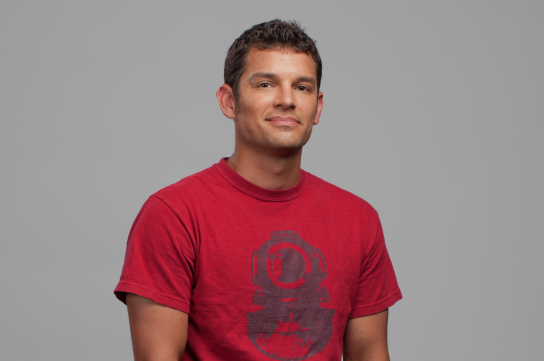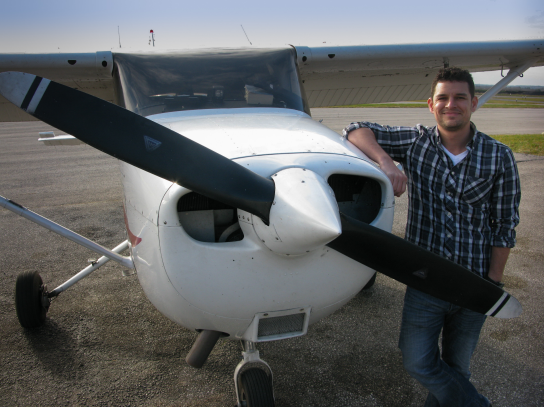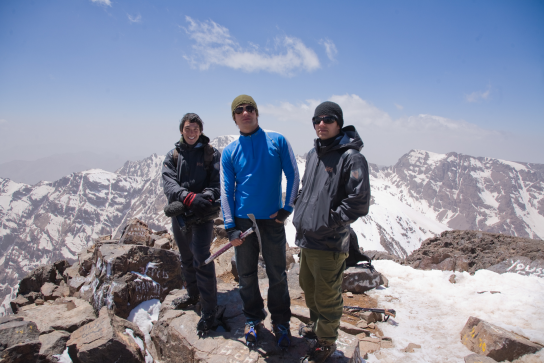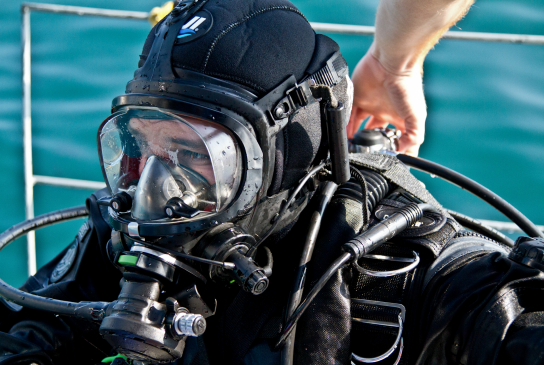By Joe Johnson (The Cascade) – Email
Print Edition: June 19, 2013
Scott Wilson is a key part of the team behind two acclaimed Canadian travel shows, Departures and Descending. One show spent three years travelling different countries, the other an underwater exploration. A few things the shows have in common: beautiful cinematography, a view of the planet with intrigue and curiosity, and a fan base across the world. With Andre Dupuis behind the lens, and co-hosts Justin Lukach on Departures and Ellis Emmett on Descending, Wilson has produced something very rare and hopes to continue doing so in the future.
What sparked your drive to actually see the world?
I think for me it started at a pretty young age. Being teachers, my mom and my dad both had the summer off, and as kids obviously you had the summer off. And so we would vacation together quite a lot, and my parents would always take us camping – long camping trips into northern Ontario.
In 1985, I was five years old and my parents took us camping across the country. We drove out to Vancouver Island and back from Ontario and saw a lot of Canada at that point. I think seeing a lot of Canada at such a young age. It really stuck with me.
As a kid that was so valuable, to have that knowledge of such an expansive country like Canada. When you start to get into your middle grades and you have to do projects on Canada, or talk about different geographical parts of the country you live in and everything, and I felt like I was so far ahead of the game. I had such a great knowledge of what the prairies look like, and where Regina was, and what the capital of Alberta was, and these sorts of things. And I think that was a huge spark for me from a very young age to take an interest in geography and what else was out there.
What’s closer to your heart, Departures or Descending?
I don’t think there’s one that’s closer to my heart. They were both co-created by myself and by Andre, so obviously they are both passion projects. When we get to create something and pitch it to the network to get it off the ground, we want to do something that is strictly a passion project and nothing else.
Despite it seeming like the best job in the world, there is a lot of stress that goes along with it. You’re not just being paid a cheque to travel around the world, the entire vision is on your shoulders and if people don’t like it—or if you don’t like it, probably just as importantly as if people don’t like it or if the network doesn’t like it—everything comes back and falls on your shoulders. When you miss a plane and you’re buying new tickets for the entire crew, it’s out of our pocket – it’s not out of anybody else’s pocket.
We take everything personally when we’re doing it, and so it has to be a huge love – both shows were definitely a huge love and a huge passion project. And it just happened that Andre and I had this vision for Departures early on of what a travel show could be—or should be—and we did that. We felt like we accomplished what we wanted to, and we did three seasons of it. At that point we started to feel like we were in danger of growing stale. We didn’t want anybody to ever say Departures was great until season four and then it kind of went downhill. It was better to burn up than fade away, and so while we still had the energy and the inspiration to keep traveling, we felt it was best to try and change gears and keep the inspiration really high.
Because it takes so much energy to do the shows – that we wanted to make sure we weren’t cheating ourselves, or cheating the product. And we had a new inspiration, something that we wanted to do and show off in a new way, and that was Descending. Unfortunately, Justin’s not a diver and kind of had no interest in that – otherwise I’m sure he would have been a part of it as well.
Was Descending easier to make happen after the success of Departures?
I think maybe it was easier for us to sell to a network because of the success from Departures. Even then, it comes with its own challenges. The network at that time actually wanted more Departures. They asked us for season four.
We said no and we said we had something else in mind. And they told us, “Whatever you’ve got in mind, you let us know.”
And Andre and I went in and sat down with them and said, “We want to do a diving show.” I think they all kind of looked around the room at each other and they were like, “Anything but that.”
And again, despite being in what we thought was a good position, we had to go out on our own dime and shoot our own demo of a show in order to properly explain to them what the show was. We wanted to show what we could do and what our vision was. I remember when we went back in with the demo—and we shot the demo actually in British Columbia—and we came in and showed the demo and they were blown away.
However, the actual creation, the filming and execution of Descending, was far more difficult than Departures. You’re spending that much time underwater. It’s risky. I mean, every time you’re underwater—let alone underwater with full facemask trying to put together a show with lights and audio equipment—there’s a lot of challenges.
Any great discoveries while diving?
Yeah, tons. Every time we went into the water, it seemed. Especially for people like us. I think that was the approach for Descending, just as it was for Departures. We’re looking at it with fresh eyes, the way anyone else hopefully would.
 When we were traveling with Departures it was the fact that we’re not well-seasoned pro travellers. We’re kind of rookies at it, and where we’re going and what we’re seeing is for the first time, just like hopefully it would be for the viewer as well. The approach with Descending was a page out of the same book – we were rookie divers being blown away by what we were seeing under the water around the world.
When we were traveling with Departures it was the fact that we’re not well-seasoned pro travellers. We’re kind of rookies at it, and where we’re going and what we’re seeing is for the first time, just like hopefully it would be for the viewer as well. The approach with Descending was a page out of the same book – we were rookie divers being blown away by what we were seeing under the water around the world.
And so that was kind of the success and approach of Descending, and the idea that every time we went underwater we saw something new. It was good because different members of the team took away different things. I mean, we all appreciated every single dive, but for Ellis I think it was more of the animal side of things – the creatures. While I was blown away by so many of the creatures we saw, for me it’s sort of always been the history – so seeing the shipwrecks, and seeing the plane wrecks from wars past (and things like that) underwater were what really resonated with me.
Just traveling for the average person, if they wanted to see the world, is that kind of a difficult cost to absorb?
We’ve had a lot of people ask, “How would I fund taking off for a year?” And it’s a really difficult question to answer. It’s based on where you want to go, how long you want to stay, what your spending habits are, what you feel is comfortable. Some people aren’t comfortable sleeping in a tent. Some people need a roof over their head. Some people are fine in places that might not be comfortable even for me, or somebody else. Everybody has kind of a different barometer of what makes a good trip and how long they need to be away for. So it’s really, really hard for me to answer that.
But plenty of people do it. It’s not like we’re the first people to do it or anything. It’s a huge risk to take, but I think if it’s what you want to do, you do your own research and find out kind of where you want to go.
It’s easier the more you can socially network, the more couches you can sleep on, or the more floors you can sleep on, as you’re kind of begging, borrowing and stealing your way around the world.
But people also have to realize for us there were certain concessions that we had to make – making a TV show. Even when I travel on my own, or with my girlfriend in Europe, we can stay at hostels and that’s fine. It was hard for us during Departures to stay at some hostels, for instance, because of that communal set-up to things. I mean, when you’re traveling with thousands of dollars worth of camera gear—and more valuable, the hard drives that contain the footage of your show that you’ve shot so far over the past month or so—you can’t afford to risk that. You can’t afford to have that stolen. We had to do things in different ways than even I do normally when I travel just for myself, or on my own.
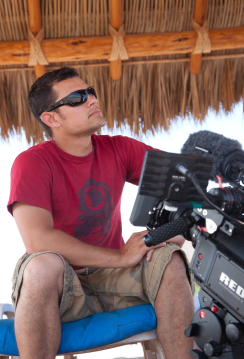 How important is it to travel and see the world?
How important is it to travel and see the world?
For me, it’s crucial. I mean, I can’t stop now. If I’m off the road for more than six months I go a bit mad. And that’s why I have to travel on my own, as well. It’s hard, too. I miss home when I’m gone, but I always try to focus on what’s in front of me.
Obviously I’m close with my family and there are elements of home that I miss, but I appreciate what I’m doing so much that I’m never home long before I want to get back on the road again and do something else.
If you’re five years old, or 25, or 65, I think you’re always in that childlike mentality when you travel. You’re a sponge and you just absorb everything because the entire world around you is new. You’re hearing a different language, you’re smelling different things, you’re tasting different things – it’s just experience overload for the body, and I think it’s a great thing. You absorb so much, you learn so much, and I think 99 times out of 100 you grow and change in better ways because you become more tolerant or more understanding of the world around you.
So what are some of the wilder things that never made it into the episodes of either Departures or Descending?
There are tons of little moments and things that happen that wouldn’t just work into the story, or would be too hard to explain and waste 10 minutes of screen time trying to explain what happened.
Or certainly moments that were just for us. I remember being on a rooftop or a precipice, or something, and there were just certain moments that would sink into you – whether they were a sunrise, or a sunset, or just seeing something happen. Andre can’t be filming all of the time, obviously, and those moments kind of went by. Sometimes they were just for us.
Did Andre have a lot of time away from the camera?
Not really. I mean he kept that thing on his side, even when we would sit down to eat dinner the camera was right there. So when you see us eating after a long day, and we’re talking about the meal we’re eating or whatever, that means that poor Andre is now waiting an extra half hour to eat because he’s got to film us eating, and talking about what we’re eating, and that sort of thing.
When we’re climbing a mountain, well obviously if you’re seeing us climb it, that means not only is Andre climbing it – he’s climbing it with a camera. There weren’t many times when Andre wasn’t filming or didn’t have the camera there. And usually if a moment was missed, it wasn’t because we decided to leave the camera behind, it was because it just happened to be at the moment we were changing a battery or Andre had been waiting and waiting and waiting for something to happen that we were expecting to happen, then you just sort of give your eye a rest and put the camera down and it happens. I mean, that’s just Murphy’s Law, and those sorts of things happen.
Spending that much time together with the three of you guys, can you talk about the relationship that develops?
I mean some of the shows you’ve got to put them together in only a couple of weeks, and you’ve got the pressure of trying to show off this country or capture your experience in just a short time. It builds a tremendous amount of stress. And so it’s a pretty special group of people that can do that together, time and time and time again, and get through it without killing each other or smashing beer bottles over each others heads and stuff like that.
You know, obviously you have fights, you have disagreements, but it’s how you handle them and it’s how you get over them. Especially with Justin, he and I were roommates the entire three years of Departures. And it was great, we always got along, and when we disagreed about things that was fine—we would disagree about them—but we could talk through them. And we could use each other as a bit of a crutch. When he was down about something, whether it was something being influenced from home, or it was something on the road, or if it was something from me, we could go out and talk about it. We could go out, even after filming was done, we could just say, “Screw it, we’re both ready to finally get some sleep but what the hell, let’s go out and let’s find place to grab a beer and talk about this,” and we would. We’d solve so many problems that way.
So I mean there’s a huge relationship that builds with people that way, it’s sort of that band of brothers mentality. You’re going through things, and experiencing things, that no one else will understand because they weren’t there. You have a near-death experience because you suddenly almost get hit by a bus, and you go through that together. That’s huge. It builds a relationships that will last a lifetime.
How has your life changed since Departures began?
I think from a personal standpoint, I’ve continued to grow and learn and develop so much, as a person, and develop an understanding of our world – of what’s going on in other places, what they look like, what other people go through.
Extrapolate that out to the show, and to the fans, and to those who have written to us and said that it’s inspired them to go places, or do things, or see things. We’ve had emails and letters from people who have been in long-term hospital care and said that the show helped them get through things. That’s huge. It’s hard to know even what to say at that point. I never expected to have the reach that it did, but I’m happy, I’m proud, and I hope we can continue to do more things like that.
It has changed my life. It certainly just burrowed in that travel bug even deeper, and it’ll even mean that the rest of my life – as long as I can put one foot in front of the other, and even maybe well beyond that, I’ll keep traveling, I’ll keep exploring. Because the world will keep changing. I can go back to Cambodia in five years and it’ll be different. I won’t be seeing it necessarily for the first time, but some things I’ll be seeing for the first time, and I’ll certainly be seeing it in a completely different light and compare it to the last time I saw it.
Because of the show I’ve been able to do and see things, and go places, I’m sure I never would have been able to get to. That’s just part of being able to do the show. The camera sometimes allows you to do [certain things, but] … sometimes it prevents you from getting in places or seeing things because a lot of people see that camera as almost an ATM machine or a price tag. They see that all of a sudden you’re doing TV, well there must be money involved. So in order to film this temple, or to go in here, or to do this or to do that, they want money for it. But more often than not it opens doors because quite often people are interested in what you’re doing. They want to show you things. They want to show off their home or their town or their ceremony, or whatever it is. And so it’s opened so many more doors that if I was just traveling to those countries on my own I don’t think would have ever been opened for me.
So it’s changed everything. It’s definitely changed everything, and it’s given me an ability to stay in the TV industry and to continue to create our ideas. And I think we’re so lucky because of that, to not just be turning out shows because they’re a pay cheque but rather we’re turning out shows because they’re a passion. The payment’s secondary. It’s not like we live in mansions or anything like that. It’s far from it. This is Canadian television; nobody’s getting filthy rich off of this. We’re doing it because it’s so rewarding that we want to keep doing it.
This interview has been edited for length and clarity.


